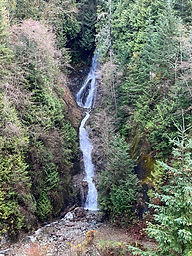Local Librarians Embrace Indigenous System
- kc dyer

- Jun 11
- 4 min read
Learning recognized as an act of Reconciliation

Teacher librarian Sarah Wethered held a conversation with Squamish Nation acitivist Adina Williams back in 2023 that changed the way she – and all her students – think about books forever.
Traditionally in the western world, research and national libraries holding large collections are organized through the Library of Congress system, and those with smaller collections will follow the Dewey decimal system of classification (DDC). Most school libraries and many public libraries are organized following this method.
Wethered has been a teacher librarian at New Westminster Secondary School in BC School District 40 for 25 years. When she and her fellow teacher librarians Jenny Chang and Lisa Seddon, (from nearby Queensborough Middle School), decided it was time for a change at their schools, it turned out to be no easy undertaking.
These librarians had known for a long time that for all his organizational skills, Dewey was an historically problematic figure.
Melvil Dewey faced "accusations that he was racist, homophobic, misogynistic, anti-Semitic, and a sexual predator," says Wethered, adding that he was kicked out of the American Librarian Association in 1905 (an organization he co-founded) for sexual impropriety.
Wethered points out how Dewey’s racist beliefs are reflected throughout his cataloguing system. "Christianity takes up 90 of the 100 numbers in the 200s, and all other religions are squished into just 10 numbers. The implication could therefore be drawn that Christianity is the dominant religion of the world, despite the fact nearly 70 percent of the global population practices a religion other than Christianity."
She was equally bothered by the fact that most of the materials addressing the many Indigenous people of North America were assigned to a single, specific call number within the History section. "This implies Indigenous culture is historical, and not a vibrant culture that still exists."
At a 2023 meeting of the BC Teacher's Federation, Wethered and Seddon spoke with Adina Williams. Wethered remembers how eloquently Williams addressed the necessity for acts of reconciliation with Indigenous people to be directly related to the work that a person did, and Williams' insistance that those acts needed to be difficult to complete, and significant.
Inspired by her words, Wethered and her fellow teacher librarians decided to do something about Dewey.
Back in November 2022, Wethered and Chang visited the Xwi7xwa Library at University of British Columbia (UBC), which catalogues their resources using the Brian Deer Classification System.
Deer was a member of the Kahnawá:ke nation, and as a librarian he created a new way of classifying information for the Assembly of First Nations in the 1970's.
"The system that he created is based on an Indigenous viewpoint and is much more flexible than the DDC," notes Wethered. Deer's method means that each library bases their catalogue on the Indigenous territory that it is situated within, and all knowledge radiates outwards from this grounding.
"Each library has the flexibility to have a slightly different classification and to tailor their classification system to their own personal context," says Wethered. She adds that the arcane numbering system associated with Dewey is replaced with letters connected to their subject matter, thereby making finding materials much easier for staff and students.
Wethered, Chang and Seddon spent the next two years reorganizing their respective non-fiction libraries away from the Dewey classification into the Deer System. In January of this year, they presented a paper titled 'How Do You Solve A Problem Like Dewey?' to the Canadian School Libraries symposium in Toronto.
"Librarianship is a profession dominated by women," says Wethered. "Yet by continuing to use the DDC, we define ourselves by a man who did not believe women were capable of doing the work required of librarians. Why should we keep ourselves rooted in a history and a system that pretended we did not exist?"
Wethered notes that since 2017, the British Columbia K-12 curriculum has had an Indigenous focus in every subject and at every grade level. This has meant that teachers have been scrambling to find resources to support this system-wide curriculum change.
"What better way to highlight them than to have them in the forefront of our catalogues, as the Brian Deer Classification System would do?"
Wethered says that all Canadians should be focusing on acts of reconciliation. "By decolonizing our library catalogue, we are doing just that."
She says that the process of decolonizing her school library has been a long job, and that they continue to work on it, but it will all be worth it in the end.
"It has been one of the most meaningful things I've ever done as a teacher librarian."
Learn more about the Xwi7xwa Library at UBC HERE, and the Brian Deer Classification system HERE.
The Watershed values your opinion.
Share your thoughts below, or email editor@lionsbaywatershed.ca
Like what you're reading?
For as little as $5/month, you can support local independent journalism
by subscribing to The Watershed HERE.








What a wonderful article! I am sending it to my friend, the librarian at Collingwood for years, using the DDC system. I'm sure she would have balked at it, if she had known of this interesting and damning history.
Interesting and informative. Thanks!